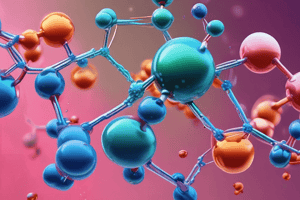Podcast
Questions and Answers
What is the main focus of inorganic chemistry?
What is the main focus of inorganic chemistry?
- The study of matter and its properties
- The study of organic compounds
- The study of elements and compounds that are not carbon-based (correct)
- The study of chemical reactions
Which branch of chemistry includes the study of metals, non-metals, and metalloids?
Which branch of chemistry includes the study of metals, non-metals, and metalloids?
- Organic chemistry
- Biochemistry
- Inorganic chemistry (correct)
- Physical chemistry
What are catalysts in the context of inorganic chemistry?
What are catalysts in the context of inorganic chemistry?
- Substances that have no effect on chemical reactions
- Substances that increase the rate of a chemical reaction without being consumed (correct)
- Substances that decrease the rate of a chemical reaction without being consumed
- Substances that are consumed in a chemical reaction
What does inorganic chemistry study in terms of molecules?
What does inorganic chemistry study in terms of molecules?
Which type of reactions does inorganic chemistry examine?
Which type of reactions does inorganic chemistry examine?
What does inorganic chemistry study?
What does inorganic chemistry study?
Which special area is included in inorganic chemistry?
Which special area is included in inorganic chemistry?
What is the importance of inorganic chemistry in medicine?
What is the importance of inorganic chemistry in medicine?
In which field does inorganic chemistry have applications?
In which field does inorganic chemistry have applications?
Why is understanding inorganic chemistry important?
Why is understanding inorganic chemistry important?
Which type of compounds consist only of hydrogen and carbon atoms?
Which type of compounds consist only of hydrogen and carbon atoms?
What is the primary focus of organic chemistry?
What is the primary focus of organic chemistry?
What distinguishes aromatic hydrocarbons from aliphatic hydrocarbons?
What distinguishes aromatic hydrocarbons from aliphatic hydrocarbons?
Which category of organic compounds contains a ring of atoms, not all of which are carbon?
Which category of organic compounds contains a ring of atoms, not all of which are carbon?
What do halogenated hydrocarbons contain, in addition to carbon and hydrogen?
What do halogenated hydrocarbons contain, in addition to carbon and hydrogen?
In which subdiscipline of chemistry are carbon-hydrogen and carbon-carbon bonds studied?
In which subdiscipline of chemistry are carbon-hydrogen and carbon-carbon bonds studied?
What is the primary focus of organic chemistry?
What is the primary focus of organic chemistry?
Which type of reactions involve the removal of two atoms or functional groups from a hydrocarbon?
Which type of reactions involve the removal of two atoms or functional groups from a hydrocarbon?
What are the crucial applications of organic chemistry?
What are the crucial applications of organic chemistry?
What do addition reactions involve?
What do addition reactions involve?
What is the process of creating organic compounds from simpler precursors called?
What is the process of creating organic compounds from simpler precursors called?
What do substitution reactions involve?
What do substitution reactions involve?
What does organic synthesis rely on to build complex organic molecules?
What does organic synthesis rely on to build complex organic molecules?
Study Notes
Chemistry: The Study of Elements and Compounds
Chemistry is the branch of science that deals with the study of matter, its properties, and the changes it undergoes. It is a significant subject that plays a vital role in various aspects of life, including medicine, agriculture, and industry. Chemistry can be divided into two main branches: organic and inorganic chemistry. In this article, we will focus on inorganic chemistry, which is the study of elements and compounds that are not carbon-based.
Inorganic Chemistry
Inorganic chemistry is a subfield of chemistry that studies the structure, properties, and reactions of elements and compounds that are not carbon-based. This branch of chemistry includes the study of metals, non-metals, and metalloids, as well as their compounds. Some key aspects of inorganic chemistry include:
-
Molecules: These are groups of atoms that are bonded together. Inorganic chemistry studies the structure and properties of these molecules, as well as their reactions with other molecules.
-
Reactions: Inorganic chemistry examines the reactions that occur between elements and compounds, such as oxidation-reduction reactions, precipitation reactions, and acid-base reactions.
-
Catalysts: These are substances that increase the rate of a chemical reaction without being consumed in the process. Inorganic chemistry studies the role of catalysts in chemical reactions and their effects on reaction rates.
-
Special areas: Inorganic chemistry also includes the study of special areas, such as coordination chemistry, which deals with the formation of complex molecules involving central metal atoms or ions surrounded by ligands.
Importance of Inorganic Chemistry
Inorganic chemistry has numerous applications in various fields, including:
-
Industry: Many industrial processes involve inorganic chemistry, such as the production of metals, alloys, and other materials.
-
Medicine: Inorganic chemistry plays a crucial role in the development of medical treatments, such as the creation of drugs that target specific enzymes.
-
Agriculture: Inorganic chemistry is used to develop fertilizers and other agricultural chemicals that help increase crop yields.
-
Environment: Inorganic chemistry is crucial for understanding and addressing environmental issues, such as air pollution and water contamination.
Conclusion
Inorganic chemistry is a vital branch of chemistry that studies the properties and reactions of elements and compounds that are not carbon-based. This field has numerous applications in various industries, medicine, agriculture, and the environment. By understanding the principles of inorganic chemistry, we can develop new materials, treatments, and technologies that improve our lives and protect our planet.
Studying That Suits You
Use AI to generate personalized quizzes and flashcards to suit your learning preferences.
Description
Explore the world of inorganic chemistry and delve into the study of the structure, properties, and reactions of elements and compounds that are not carbon-based. This branch of chemistry has wide applications across various industries, medicine, agriculture, and environmental sciences.



